ID: PMRREP35158| 147 Pages | 11 Jul 2025 | Format: PDF, Excel, PPT* | Industrial Automation

The U.S. Roofing Material market size is likely to be valued at US$ 23,558.9 Mn in 2025 and is expected to to US$ 33,946.0 Mn by 2032 with a CAGR of 5.4% during the forecast period from 2025 to 2032.
The U.S. roofing materials market is witnessing a positive trend toward energy-efficient, storm-resistant, and aesthetically enhanced roofing systems, driven by climate concerns, evolving building codes, and homeowner preferences. Manufacturers are increasingly investing in solar-integrated, fortified, and sustainable solutions to meet the rising demand for performance-based and resilient roofing technologies.

Key Industry Highlights:
|
Market Attribute |
Key Insights |
|
U.S. Roofing Material Market Size (2025E) |
US$ 23,558.9 Mn |
|
Projected Market Value (2032F) |
US$ 33,946.0 Mn |
|
U.S. Market Growth Rate (CAGR 2025 to 2032) |
5.4% |
|
Historical Market Growth Rate (CAGR 2019 to 2024) |
4.8% |
The U.S. roofing material market is growing due to the rising residential renovation activities, particularly in the Northeast regions. Recent events like the June 2025 fire outbreak in Los Angeles, which damaged several homes and strained emergency response systems, have increased the awareness of fire-resistant and durable roofing solutions among homeowners.
Government initiatives such as the Weatherization Assistance Program and HUD’s Community Development Block Grant are encouraging homeowners to invest in roofing materials to improve energy efficiency and disaster resilience. Furthermore, the adoption of stricter building codes in wildfire-prone states such as California is reinforcing the market toward high-performance roofing systems.
The manufacturers are investing in expanding their market reach. For instance, in June 2025, GAF, a Standard Industries company and North America’s largest roofing and waterproofing manufacturer, announced construction had begun on its new, world-class shingle manufacturing facility in Newton, Kansas.
The high initial cost is the major restraint in the U.S. roofing materials market. It limits their adoption among cost-sensitive homeowners and small-scale contractors. The major improvement in the roofing material provides advanced materials such as metal, synthetic composites, and solar-integrated shingles.
Such materials offer superior durability, energy efficiency, and aesthetic appeal. These advanced properties require significantly higher upfront investment compared to traditional options like asphalt shingles. The increasing pricing gap poses a challenge, particularly in regions with lower household incomes. Furthermore, the labor shortages and increasing installation costs further worsen the affordability concerns, as skilled roofing labor is in short supply across many parts of the country.
The U.S. roofing materials market is witnessing a significant opportunity in the adoption of energy-efficient and storm-resistant roofing systems, driven by growing climate damages and developing regulatory frameworks. Growing awareness among homeowners, with rising property losses from storms and hurricanes, is driving the demand for roofing solutions.
The government programs, such as FEMA’s Building Resilient Infrastructure and Communities and the HUD-funded Community Development Block Grants, are leading the application of investments in upgraded roofing across various residential zones. Furthermore, the Infrastructure Investment and Jobs Act supports community resilience and housing modernization, which is fueling the demand for advanced roofing solutions. The market players are investing in product innovation with the support of the government institutions. For instance, in May 2025, CertainTeed®, a leading North American manufacturer of sustainable building materials, announced a new collaborative effort with the Insurance Institute for Business & Home Safety (IBHS), reinforcing its commitment to resilient and durable construction. As a result of this initiative, CertainTeed now offers a complete roofing system that meets the rigorous standards of the IBHS FORTIFIED™ Roof program.
Bitumen leads the U.S. roofing materials market, driven by its good weather resistance and ease of use in slope structures. It is mostly applied in the residential sector due to its cost-effectiveness. Its proven performance in harsh conditions and great adaptation with modern insulation technologies make it a preferred choice for homeowners and contractors.
The market players are also investing in product innovation to provide more advanced solutions to the end users. For instance, in February 2025, GAF Energy, the solar business unit of GAF, a Standard Industries company and North America's largest roofing and waterproofing manufacturer, is announcing the launch of Timberline Solar® ES 2. The launch marks the latest evolution of the world's first nailable solar shingle, first introduced in 2022. The ES 2 delivers 23% more power than its predecessor while offering enhanced installation efficiency and expanded design compatibility.
Sloped roofing dominates the U.S. roofing materials market, due to its high adoption in the residential sector. Its structural benefits the homes in many ways, such as efficient water runoff, enhanced durability, and aesthetic appeal. These properties are highly needed in various harsh climates, especially in regions such as the Northeast and Midwest, where heavy snowfall and rainfall are significant concerns.
The government programs are increasingly encouraging homeowners to renovate their properties to be more resilient and energy-efficient. For instance, the U.S. Department of Energy’s Weatherization Assistance Program and various state-level green building incentives promote energy-conscious roofing upgrades.
Residential roofing leads the U.S. roofing materials market, with the share of ZZ%, primarily driven by rising housing renovations. The residential roofing is demanding more material due to growing roof replacements and homeowners’ demand for energy-efficient and aesthetic solutions.
The government’s increasing focus on more durable roofing systems through the federal and state-level support programs is driving the demand for roofing materials in the residential sector. The initiatives such as the Weatherization Assistance Program and FEMA’s Hazard Mitigation Grant Program, are encouraging the homeowners to upgrade the roofing systems to more durable and energy-conscious systems.
The manufacturers are investing in expanding their market reach. For instance, in April 2023, Atlas Roofing Corporation, a leading North American manufacturer of innovative, high-quality building products, announced that its new $200 million asphalt shingle manufacturing facility will be built in Clinton, IA. The facility represents the next phase of a vision to empower its people to create solutions and products with purpose, while creating additional shingle capacity in a geographic location that best serves its customers.

The Northeast region holds a dominant position in the U.S. roofing materials market, driven by its dense population and frequent exposure to extreme weather conditions. The region faces aging housing stock due to high renovation costs, in addition to harsh climates such as snowstorms and hurricanes. The government programs, such as the U.S. Department of Housing and Urban Development’s Community Development Block Grant, are encouraging the property owners to apply resilient and energy-efficient roofing installations across older urban neighborhoods by providing incentives.
The manufacturers are expanding their market reach through acquisitions and partnerships. For instance, in April 2025, QXO, Inc. announced the completion of its previously disclosed acquisition of Beacon Roofing Supply, Inc., for $124.35 per share, valuing the transaction at approximately US$11 billion. The transaction makes QXO the largest publicly traded distributor of roofing, waterproofing, and complementary building products in the United States.
The U.S. roofing materials market is moderately fragmented by the presence of several established players competing through innovation, geographic expansion, and product diversification. Leading market players are focusing on developing product performance, sustainability, and energy efficiency to meet evolving regulatory standards and consumer preferences. The market is witnessing a rise in investment in advanced roofing systems, including solar-integrated shingles and recyclable or eco-friendly materials. The large firms are also pursuing strategic acquisitions to strengthen their distribution networks and manufacturing capabilities.
Regulatory support through initiatives like the FEMA FORTIFIED™ program and DOE-backed energy efficiency grants is further fueling product development and differentiation among leading players.
Yes, the market is set to reach US$33,946.0 Mn by 2032.
The growing number of residential renovation projects, combined with harsh winters in the U.S., is propelling the market growth.
The growing climate resilience and federal funding for advanced roofing solutions are creating opportunities in the U.S. roofing material market.
The residential sector is the fastest-growing application in the market.
GAF Materials Corporation is considered the leading player in the U.S. roofing material market.
|
Report Attribute |
Details |
|
Forecast Period |
2025 to 2032 |
|
Historical Data Available for |
2019 to 2024 |
|
Market Analysis |
US$ Million for Value |
|
Key Regions Covered |
|
|
Key Market Segments Covered |
|
|
Key Companies Profiled in the Report |
|
|
Report Coverage |
|
|
Customization & Pricing |
Available upon request |
By Material
By Type
By Application
By Region
Delivery Timelines
For more information on this report and its delivery timelines please get in touch with our sales team.
About Author